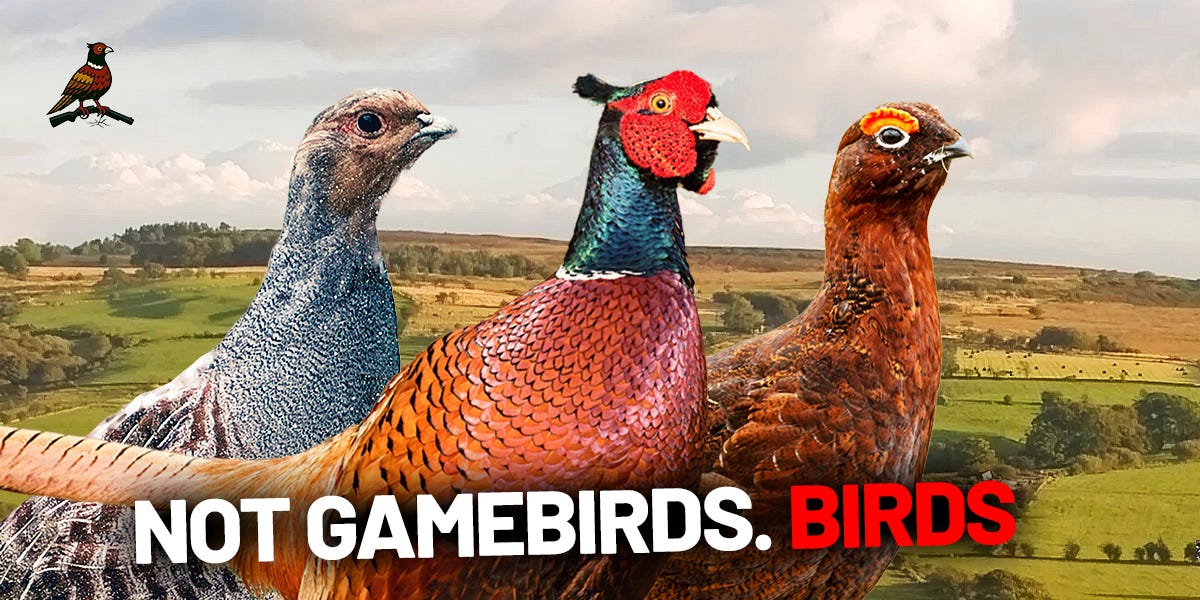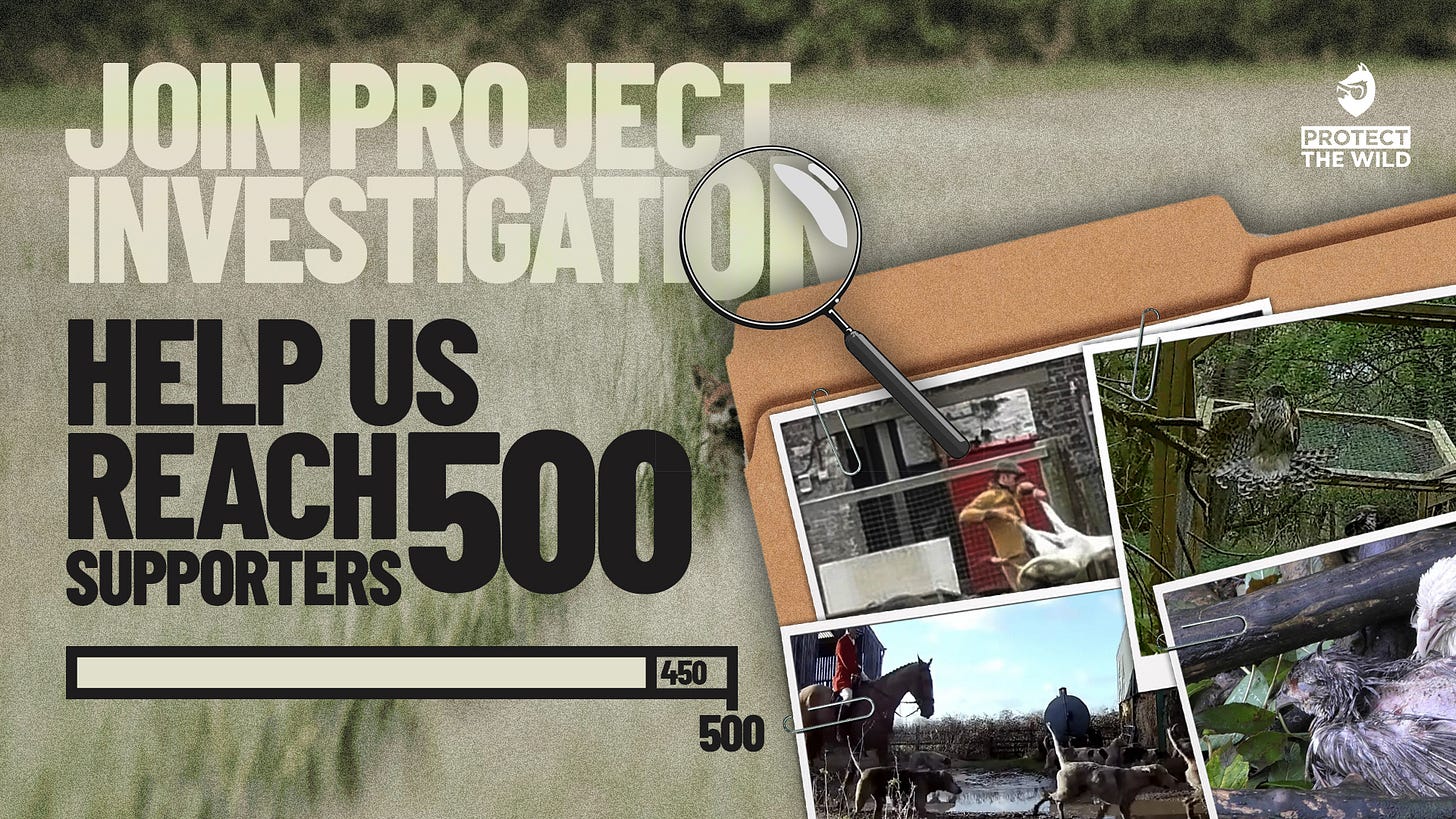Why we won't use the term 'gamebird'
And why we hope you won't either...
Shooting - and the shooting industry - is coming under pressure like never before. More and more of us are looking at this grubby, crime-ridden ‘sport’ and concluding that it doesn’t fit with what we feel about birds and wildlife, what we know about animal sentience (an animal's ability to experience feelings, emotions, and conscious awareness), and what we know should be our collective response to the twin crises of crashing biodiversity and a heating planet.
That it still remains ‘out there’ shouldn't come as too much of a surprise though. Killing birds has been normalised over generations, glamourised by the royals, legislated for by wealthy landowners, and pumped into our homes through supportive media. Our leading wildlife organisations don’t speak out against it, ‘shooting tourism’ in regions from Devon to the Scottish Highlands has been built around it, and some celebrities still think ‘adopting a shooting lifestyle’ is a sign they’ve ‘made it’ (yes, Mr Beckham, we’re thinking of you). Undoing all of that will take time, but undoing it is what we plan to do.
We’ll be setting out policies - the ‘how’ that underpins the ‘why’ - over the coming months. To start with, though, we’d like to explain why (unlike many other organisations that want to see an end to shooting) we won’t use the term ‘gamebird’. It might seem like a ‘small thing’, but we will argue until the sun forgets to rise that the language we use is hugely important to the way we think and campaign.

Not ‘gamebirds’, birds like any other
Pheasants, partridges, grouse, ducks, geese, woodcock, snipe and the rest of the species killed by shooters are birds. No different to the birds in our gardens, in nature reserves, or woods, lakes, or over the sea. There is nothing in their biology to explain why we should accept some birds being ringfenced as targets for so-called ‘sportsmen’. There is no reason that the shooting industry should be allowed to justify slaughtering huge numbers of them under a false distinction that these are ‘game’ and therefore killing them for fun is somehow okay. It’s not okay, no matter what language is used to justify it.
This may seem pedantic to some, but if we’re serious about tackling shooting (and we here at End Bird Shooting certainly are), then the language we use to describe wildlife is hugely important.
That’s because language is an essential part of the platform we build our work upon. In more general terms, language encodes and externalises our thoughts. The words we use express what we think about the person, animal or object we are describing.
Shooting and hunting have had a malign but undeniably strong influence on our language. It’s led us to sometimes use language too casually or without question. Over many years, for example, we have been persuaded by shooting interests that some wild animals are ‘vermin’, that animals need to be ‘managed’, that ‘culling’ is somehow an entirely different thing to killing, that ‘tradition’ is more important than modern thinking, that after months of trapping and snaring wildlife the start of a season of blasting Red Grouse out of the sky is somehow ‘Glorious’.
We’ve certainly done that with foxes. When did we as a society decide that foxes are ‘vermin’ and must be ‘managed’? They’re a natural part of a healthy ecosystem. A native mammal that is one of the last predators we’ve allowed to survive in our nature-depleted country. We’re not ecologically illiterate anymore, yet the shooting industry still tells us that ‘vermin’ are rampaging through their estates killing ‘their’ birds – conveniently skipping over the fact that by releasing vast numbers of those birds into the countryside they are actually providing food to predators that might otherwise not survive the winter. Foxes, they tell us, are a ‘problem’. They are – to use their heavily loaded and discriminatory word – ‘vermin’.
And we’ve also been persuaded that some birds are ‘gamebirds’. That they are species that some people can legitimately hunt, chase, shoot, trap, or just plain kill for fun (historically for food, perhaps, but these days for fun)..
We can do better than simply going along with that, surely?
Not their birds
‘Gamebird’ is a term that wouldn’t exist were it not for shooting and hunting. Historically, it was used solely to separate off a handful of species that Kings and wealthy landowners wanted for themselves. Red Grouse, Black Grouse, Ptarmigan, partridges and pheasants, ducks and geese, some of the shorebirds like Woodcock and snipes.
So how about we stop using it? Some people will say, So what, it’s just a word. It’s been in use for hundreds of years. We all know what it means. Why change it? Why even try to change it? Or even, You can’t change it, so don’t bother.
We will bother because the term says, ‘these are ours’. It is rooted in property and ownership, not nature or science. The ‘game’ laws that were enacted centuries ago to prevent anyone from hunting grouse and partridges unless they had freeholds of at least £100 a year, or long leaseholds valued at £150 (a fortune relatively speaking) would eventually lead to the same species not given full protection under the RSPB’s 1904 Charter and left without the full protection of the Wildlife and Countryside Act of 1981. They have led to ‘seasons’ where anyone with a gun can go out and kill these species on a day out. Led to mass releases of so many farmed pheasants and partridges that at the start of yet another shooting season they cumulatively weigh more than all the other birds in Britain combined.
‘Gamebird’ is a shorthand for cruelty, the illegal persecution of raptors on shooting estates, the deaths of millions of predators in traps and snares, the seasonal slaughter of millions of birds. It also allows shooters to be incredibly lazy with identification: if everything is a ‘gamebird’, why bother learning the distinction between a Red Grouse and a Ptarmigan, a protected Brent Goose from a non-native Canada Goose, a Red Listed Pochard from a Mallard? They’re just a ‘thing you shoot’ after all.
To repeat, there is no basis in biology for ‘gamebirds’ being cleaved off as targets for so-called ‘sportsmen’. There is no reason that the shooting industry should be allowed to justify slaughtering huge numbers of them under a false distinction that these are ‘game’ and therefore killing them for fun is somehow okay.
It’s not okay, no matter what language you use to try and justify it.
Of course we can change language
To anyone saying, ‘You can’t change the way people speak’, we absolutely can. Language is constantly changing. The Global Language Monitor estimates that around 5,365 new words are created annually. The words we use can quickly become unacceptable. The racist, homophobic language once commonly used in TV sitcoms is rightly condemned now. We don’t use derogatory terms to describe people with cognitive differences. Thankfully, value-based language like ‘invalid’ has largely been confined to history.
In our opinion, the same critical thinking now needs to take place vis-à-vis our relationship with wildlife. It is not ours to rate. Not ours to decide what to do with, exploit or use. And it’s not ours to separate or categorise based on what hunting/shooting lobbyists would like us to think.
We can’t think of a single reason why anyone who loves birds should buy into the term ’gamebird’ anymore. Or why articles in birding magazines or statements by ‘wildlife organisations’ should use it either. Yes, it will take a fraction longer to write out the names of the birds we’re referring to, but anyone who loves birds is already used to identifying species, used to writing down their names.
We don’t see birds as ‘brace’ or ‘bags’, we already see individuals anyway (which is one of the reasons that a grouse shooter like the Duke of Cambridge has no place as Patron of an organisation like the British Trust for Ornithology whose work is driven by volunteers supplying data, accurate counts and specific identifications). We shouldn’t think of them as ‘gamebirds’ either.
We can do better
These are birds. Not ‘gamebirds’, just birds. That’s how we should describe them. When we use the term ‘gamebird’ – and many of us do because it’s something we’ve grown up with and never questioned before – we are colluding with history and colluding with shooting. We can do better than that.
Is it a more important issue than say climate change or mass extinction? That’s not the point. Protect the Wild campaigns on many fronts - from calling out so-called ‘trail hunting’ and the badger cull to bird shooting and biodiversity loss. The End Bird Shooting campaign is about changing culture, and how we use language is very much part of our culture.
Besides which, the value-laden and discriminatory terms that the shooting and hunting industries use are probably intertwined with issues that (if you’re reading this anyway) do matter to you. Pulling at one will help unravel them all. Birds may not inspire you in quite the same way that they do us, but the very word ‘gamebirds’ - partly deliberately and partly because it’s ‘traditional’ and not been challenged nearly enough before - is being used to justify ‘sport’ and killing and cruelty. Of ownership. Of disrespect for wildlife.
It might seem a small thing perhaps, but it’s often through ‘small things’ that opinions are changed. One person at a time. One event at a time. One realisation that just because we’ve always done something one way doesn’t mean we can’t do it differently in the future. One more argument that we just can’t deny to ourselves anymore.
Societal advances are often measured by changes in descriptive language. Getting rid of the term ‘gamebird’ and just using ‘bird’ instead will be one more step forward. One more step towards ‘de-normalising’ the shooting industry. One more step to pulling away the veil this horrible industry uses to justify the mass slaughter of millions of birds.
Like to help End Bird Shooting/Protect the Wild fund investigations?
Protect the Wild has launched Project Investigation, a fundraising drive to raise £2,500 a month so we can run investigations - including into the bird shooting industry - without compromising our support to frontline monitors and sabs. We’re asking 500 people to donate just £5 a month — enough to fund consistent, fearless, high-impact work that exposes cruelty and forces change. If you believe in what we do, be one of the 500 and help fuel this fight.
We’re currently on 450 donors! 90% of the way there!






I fully agree with you Charlie! I can't stand the term "game" to "describe" a bird or an animal as it makes them sound like targets for shooting for sick so called "fun"! It is hunter terminology as far as I am concerned and it normalises the birds/animals being killed. "Culling" is literally no different to hunting and "tradition" was once often used to excuse anything from vile bear baiting to denying women the chance to do anything that was once viewed as "non traditional". As for "vermin", the one and only species I consider as "vermin" are evil human beings! 3 sayings I really wish were replaced as well are "like a/the guinea pig" (making cruel "experiments" on guinea pigs seem fine and normal), "kill 2 birds with one stone" and "stone the crows" (they both normalise killing and cruelty to birds). Why not instead say "like a/the test tube", "stone the walls" and "feed 2 birds with 1 scone" instead?
Never thought that David Beckham would kill innocent animals . Gone right off him. Dont forget you come from London !!